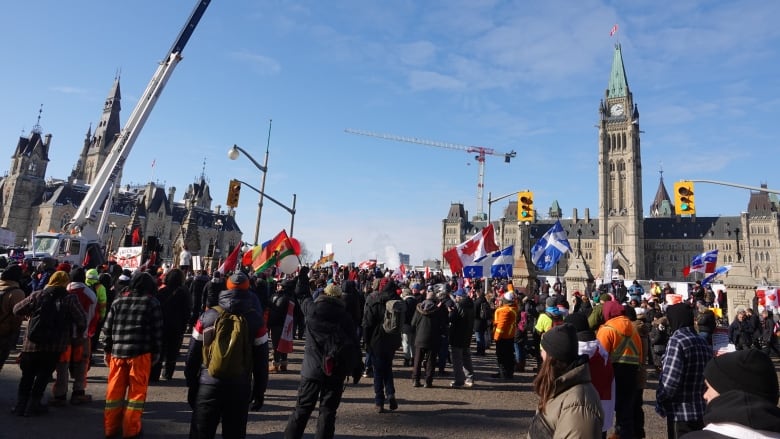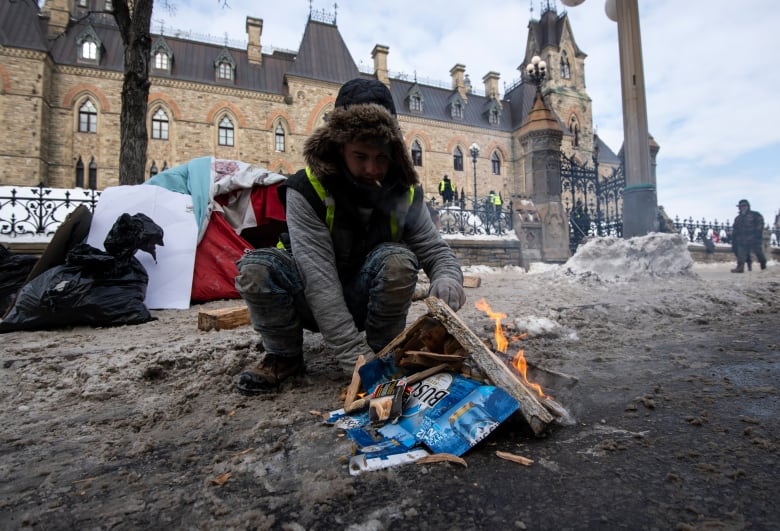Conservatives hitch their wagons to the convoy protest without knowing where it's going
The protest is unpredictable, its goals are uncertain — and the nation is watching
As the convoy rolled into Ottawa on Friday afternoon, Pierre Poilievre stood on a highway overpass to film a promotional video.
Speaking directly to the camera, with trucks honking behind him, Poilievre proposed an expansive view of the convoy that went well beyond its nominal goal of protesting the vaccine mandate for cross-border truckers.
The protest, Poilievre said, "was not just for truckers, but for the 60 per cent of Canadians who say they worry they can't afford food." It was for "the 60-year-old small businessman who has spent his entire adult life building up an enterprise and watching it wiped out … the depressed 14-year-old who's been locked out of school" and "the families that can't take it anymore."
In Poilievre's telling, the convoy represents "the people who want to stand and speak for their freedoms" and "all those that our government and our media have insulted and left behind."
"Freedom, not fear," Poilievre concluded. "Truckers, not Trudeau."
WATCH: MP Pierre Poilievre discusses his support for protest convoy
That video may soon mark the unofficial launching point of a new Conservative leadership race. But if Conservatives have hitched their wagon to this convoy, it remains to be seen where it will take them.
By Monday morning, even Poilievre felt the need to state that his embrace of the movement did not extend to all of its members. Erin O'Toole, still officially the leader of the Conservative Party, did so on Saturday night.
"People flying evil confederate or Nazi flags or disrespecting monuments are individually responsible for reprehensible acts," Poilievre tweeted. "They do not represent the thousands of lawful truckers who are actually part of the protest and are peacefully championing their livelihoods & freedoms."
But the troubles have not been limited to a few flags.
Maskless individuals forced the Rideau Mall in downtown Ottawa to close. Operators of a downtown homeless shelter said some protesters showed up at their door, demanded to be fed and harassed the staff; the shelter's CEO said one of their clients was assaulted.
Rocks reportedly were hurled at an ambulance. The "F–k Trudeau" flags are everywhere. The traffic disruption forced a vaccine clinic and a school to close. Ottawa residents have reported being harassed.
But there were warning signs even before the convoy arrived in Ottawa — such as the views expressed in the past by its organizers. The stated purpose of the convoy was to deliver a "memorandum of understanding" effectively calling for the undemocratic overthrow of the federal government so that all vaccine-related restrictions in Canada might be lifted. One organizer told an interviewer last week that the prime minister is a "criminal."
Conspiracy theories
It also isn't obvious that the convoy represents more than a minority of truckers in Canada.
If Conservatives now have to carefully parse this protest to explain precisely which elements they agree with and which they renounce, their flirtation with the convoy echoes the party's brush with the United We Roll protest in 2019. That movement — nominally about the plight of the oil and gas industry — became associated with anti-immigrant sentiments and conspiracy theories about a global pact on migration.
Poilievre, who also played footsie with "great reset" conspiracy theorists in 2020, posted his overpass video with the hashtag #FreedomOverFear. In a subsequent video, he was recorded telling a small group of protesters that "governments have taken advantage of COVID to try and take away our freedom and give themselves more power."
Poilievre knows that public health restrictions on businesses and schools are the responsibility of provincial governments. He knows that most of those provincial governments are run by ideological cousins of the Conservative Party. But his call for "freedom" over "fear" is another enigmatic bit of alliteration from a politician who has described the trucker mandate as a "vaccine vendetta."
Living in total freedom might be preferable to living in fear, but in the context of a pandemic the notion that freedom should come before fear might suggest that individualism should matter more than public health.
Many Canadians — not least the medically vulnerable and immunocompromised — would no doubt like to live without the fear of a potentially deadly virus or overcrowded hospitals, and believe that vaccination and restrictions on the unvaccinated are the only way they can be free to do so.
An overwhelming majority of Canadians, along with the citizens of nearly every country on Earth, might be tired and frustrated right now — but they might not share Poilievre's view of who and what is to blame.
Riding a wave of rage
Whatever spirit — or anger — the convoy is carrying, Conservatives seem keen to capture some of it without taking responsibility for everything about the protest. They may see some of their own supporters in the crowd. They may fear that if the Conservative Party doesn't co-opt the convoy's energy, the People's Party will.
After making a great deal of noise, the convoy might fade away. Even Conservatives eventually might feel compelled to tell the protesters to go home.
But Amarnath Amarasingam, an associate fellow with the International Centre for the Study of Radicalisation, suggested this weekend that the convoy could become something like the Tea Party movement in the United States. In that case, what began as a loud protest against President Barack Obama ultimately became a driving force in the modern Republican Party.
It's far too early to say that's what the convoy might become — or even to guess at where this might be headed.
But once you've hitched yourself to a moving truck, it can be hard to jump off. And if a Conservative leadership race is about to start, a crowd of motivated and aggrieved citizens might look like a lucrative constituency to court.


No comments:
Post a Comment